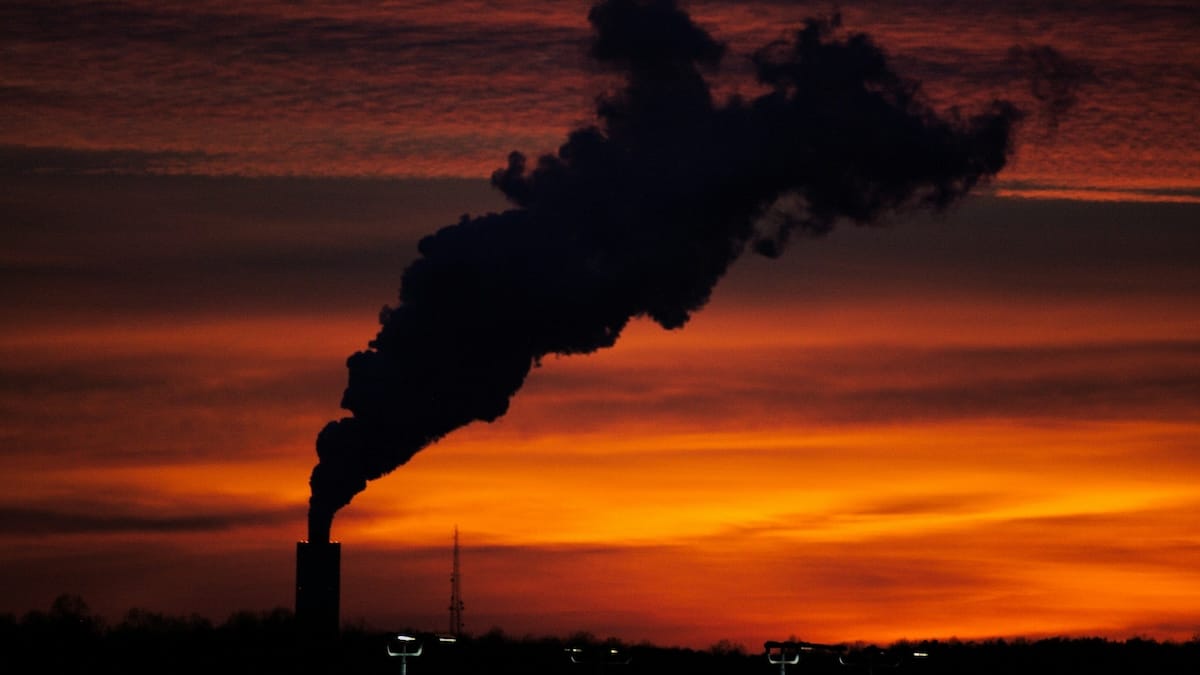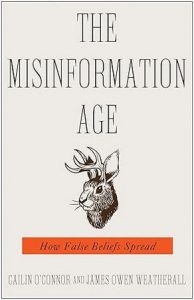Doing next to nothing, while the world burned.
- Our time will be remembered for nothing else than our inaction on climate change;
- David Wallace-Wells searches for a silver lining;
- A book I’m reading recalls similar conservative resistance to action on the ozone layer and acid rain;
- How humans are responsible for our future, and can’t keep blaming “acts of God”;
- Peter Gabriel’s “In Your Eyes.”

OnlySky, Dale McGowan, 21 Jan 2025: The unforgiven generations, subtitled “We will be remembered for nothing else.”
The generations currently in their third or fourth act—Baby Boomers and Gen X, born roughly 1946 to 1980—have contributed a dizzying mix of positives and negatives to the world. We created the internet and personal computing; remade arts and entertainment in good and terrible ways; spurred incredible economic growth, then killed the middle class; opened up greater access to higher ed, then saddled a generation with crushing debt. We were the ones who put cultural diversity on the front burner, then said “just kidding” in the voting booth. We changed the essence of parenting and childhood for better and worse. We brought torture and imprisonment without charge back into vogue. We stopped a pandemic in record time with a vaccine that we then refused to take. We elected a gifted president who surrounded himself with talent and intelligence, and we elected an autocratic narcissist whose damage has only begun to play out.
None of it will be remembered for long.
Decades from now, even centuries, the adults of the past 50 years will be associated with one thing only: climate inaction. And we will not be forgiven.
Recalling the fall of Rome, the French Revolution, US slavery and the Civil War, the exploitation of workers in the early Industrial Revolution, Naziism.
But we will be remembered with greater contempt than any of these.
The reason is this: No other fumbling of the ball will pass on as much daily human misery to the future as our failure to respond to the climate crisis when we still could. No one feels the negative consequences of the demise of Res Publica or the Ancien Régime every morning. But the consequences of a climate that has spun irretrievably out of control will be woven deep into every part of the human experience for centuries to come.
The piece concludes: Only poor excuses remain.
There are so many excuses and explanations for pressing the accelerator as our planet approached the cliff: The tragedy of the commons (in which individuals or nations acting in their own self-interest overexploit or destroy a shared resource, to the detriment of everyone including themselves), ignorant denial (“temperatures have always gone up and down”), concerns about job losses, simple inconvenience and short-term greed, the relative abstraction of it all, and the slowness of the pot’s boiling, with the most serious consequences delayed.
The generations facing first heatwaves, droughts, and powerful storms, then dramatically rising sea levels, devastating floods, and intense agricultural stress, then Amazon die-back, the displacement of millions, the collapse of polar ice sheets, ecosystem failures, mass extinctions, food and water insecurity, and a decimated global economy—all now expected before 2100—those people will certainly find it hard to understand our far-reaching selfishness, and even harder to forgive.
And of course, if any one person will be seen as representing this short-sighted intransigence, it will be: Donald Trump. Because the US, in some sense, still leads the world. And the condemnation by future generations will fall through onto all those who voted for him.
\\\
The author of THE UNINHABITABLE EARTH (review here) searches for a silver lining.

NY Times, David Wallace-Wells, 22 Jan 2025: Trump’s Paris Withdrawal Is Grimmer This Time
The line of destructive executive action on climate was entirely predictable on President Trump’s Day 1: withdrawal from the Paris agreement, a threat to clean-energy subsidies, a promise to ban offshore wind and radically accelerate the energy permitting process (though that last one contains, potentially, some upside). It’s not yet clear how all this will net out — executive actions are memos in search of policy, and the slow decline of emissions has proved pretty stubborn lately. But it isn’t likely to be salutary, and the symbolism is undeniably grim.
Grimmest, perhaps, was the withdrawal from the Paris climate agreement — which, though it is a rerun of what he did in 2017, takes place in a very different global environment.
Eight years ago, when Trump made a show of exiting Paris while “Summertime” played in the White House Rose Garden, it helped kick off a remarkable period of worldwide solidaristic backlash — the global climate equivalent of the liberal “resistance.” We owe much of the climate progress of the last decade to that resistance — to climate protesters, sympathetic prime ministers and presidents and legislators, entrepreneurs and banks and asset managers who understood the urgency of action clearly enough to see it as a financial opportunity, too.
\\\
 Coincidentally today I’m reading a book called THE MISINFORMATION AGE, subtitled “How False Beliefs Spread”, by Cailin O’Connor and James Owen Weatherall, a book from 2019 that I’m just getting around to. Its thesis is that misinformation spreads in social settings (not because people are stupid, or subject to psychological biases), something I’ve suspected for some time, but the second chapter, “What Is Truth?”, discusses two examples of how scientific ‘truth’ is disputed by those who have vested interested in maintaining the status quo, i.e. doing nothing to ameliorate climatic threats. The ozone layer, and acid rain, both understood centuries ago but which were recognized as active threats in the 1970s. Science is never absolutely certain, so DuPont pushed back against (trivial) uncertainties to maintain manufacture of CFCs. Studies of acid rain were conclusive, but in the early ’80s Reagan appointed a member of the advisory committee on the subject who concluded that the cheapest thing to do was to do nothing. And so nothing was done, until Reagan left the White House.
Coincidentally today I’m reading a book called THE MISINFORMATION AGE, subtitled “How False Beliefs Spread”, by Cailin O’Connor and James Owen Weatherall, a book from 2019 that I’m just getting around to. Its thesis is that misinformation spreads in social settings (not because people are stupid, or subject to psychological biases), something I’ve suspected for some time, but the second chapter, “What Is Truth?”, discusses two examples of how scientific ‘truth’ is disputed by those who have vested interested in maintaining the status quo, i.e. doing nothing to ameliorate climatic threats. The ozone layer, and acid rain, both understood centuries ago but which were recognized as active threats in the 1970s. Science is never absolutely certain, so DuPont pushed back against (trivial) uncertainties to maintain manufacture of CFCs. Studies of acid rain were conclusive, but in the early ’80s Reagan appointed a member of the advisory committee on the subject who concluded that the cheapest thing to do was to do nothing. And so nothing was done, until Reagan left the White House.
But both were eventually solved, by acknowledging the science.
\
We see this again and again. As humanity fills up the planet and has ever-increasing effects on the biosphere and the climate, some people perceive the consequences and want to take action; others deny the evidence either because they are stupid (some of them are; they can’t perceive consequences beyond the very short-term) or selfish. The latter don’t care about the future; they are more interested whatever benefits them right now. So it is, apparently, about Trump, and his fans.
\\
Here’s another way of putting this issue. Humans are responsible for their own future. We can’t keep blaming things on God. And those who do are dim, or selfish.

Vox, Bryan Walsh, 22 Jan 2025: There are no “acts of God” anymore, subtitled “The Los Angeles wildfires show the influence of humanity in the world — and our inability to control it.”
Originally, an “act of God” was largely a way for insurers to get out of paying claims. At a time when risk assessment and prevention was still primitive, natural disasters and other acts of God were generally not covered, because there was no way to insure against what was still unforeseeable.
But as both the insurance industry and risk prediction matured, that category began to shrink. Storms could be forecast; seismic zones could be identified; flood zones could be calculated. Insurers could price specific policies for specific risks with greater and greater confidence; if we couldn’t always prevent a disaster, increasingly we could at least see it coming and know why, and therefore prepare. It wasn’t the gods or God who made the earth move — it was the movement of tectonic plates.
The writer discusses the problem of evil, and Greek ideas of gods.
The environmentalist and tech thinker Stewart Brand has a quote that always stuck with me: “We are as gods, and might as well get good at it.”
…
The problem is, we are not good at it. Being gods, I mean — not yet. I believe that the Los Angeles wildfires are largely the result of human action, or inaction. The greenhouse gases we’ve pumped into the atmosphere, contributing to the “hydroclimate whiplash” that primed LA’s forests to burn. The housing and insurance policies that put too many homes in a wildfire danger zone, too many of which were built to burn. The small mistakes of judgement in the governmental response to the fires, and the bigger errors of overconfidence that made it possible to believe that such a place as Los Angeles could exist where it did, and everything would be fine.But the precise combination of factors that led to the fires, and the precise series of actions to take Los Angeles into a safer future — that is much, much harder to know. Which doesn’t stop the avalanche of voices who are perfectly confident in exactly who is at fault and what we should do. It’s a pattern I see in global challenge after global challenge, from artificial intelligence to pandemics to climate change. And I believe that attitude is why, increasingly, the aftermath of a disaster isn’t unity, but division. Each side is convinced they alone know who is at fault, and they alone know how to fix it.
\\\
I’m tickled how Paul Krugman, now on Substack every day, concludes each column with a video of a song, as I’ve done intermittently over the years. Today, I’ll copy his. A live version of “In Your Eyes.” One of the best Peter Gabriel songs.





